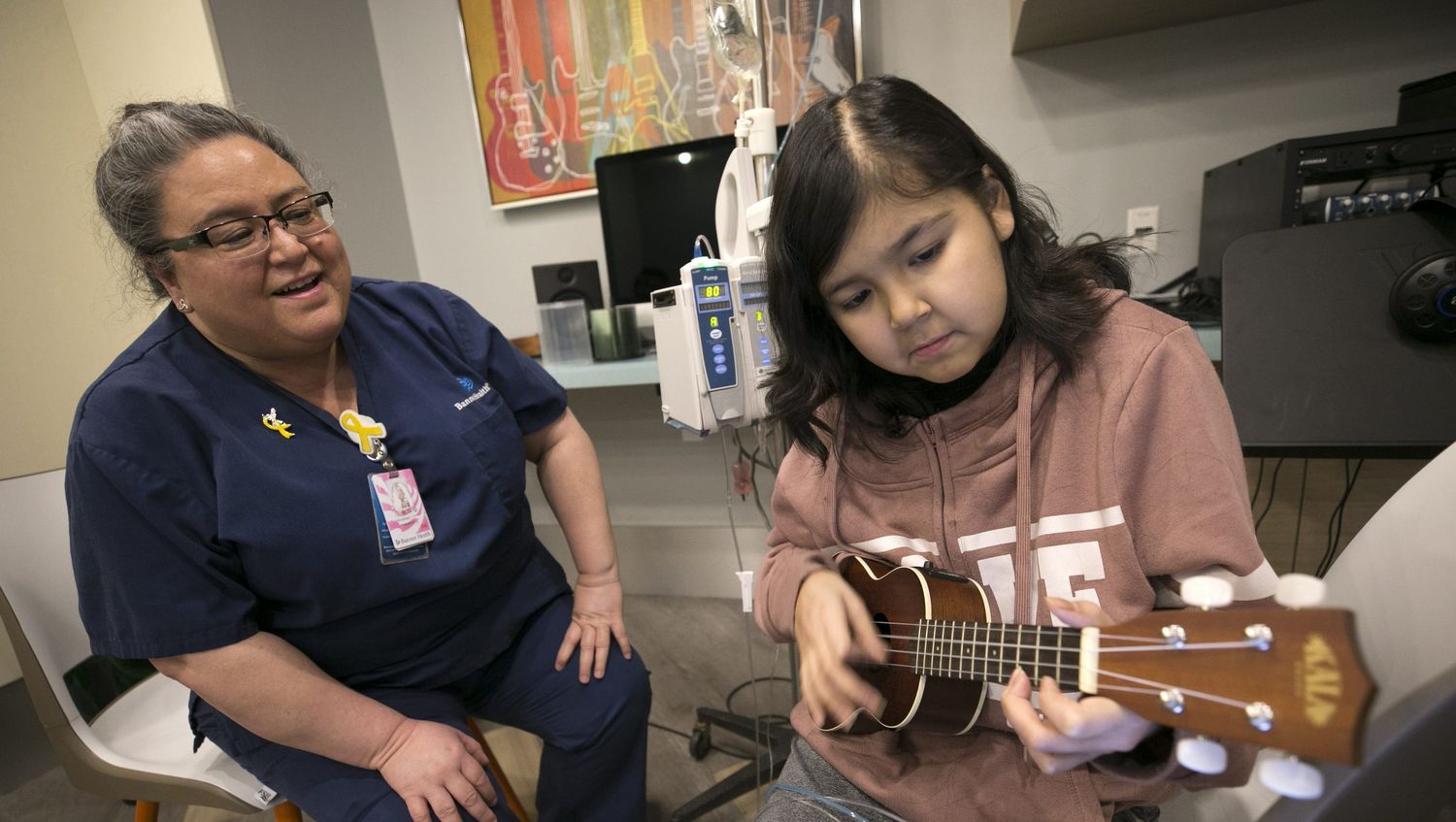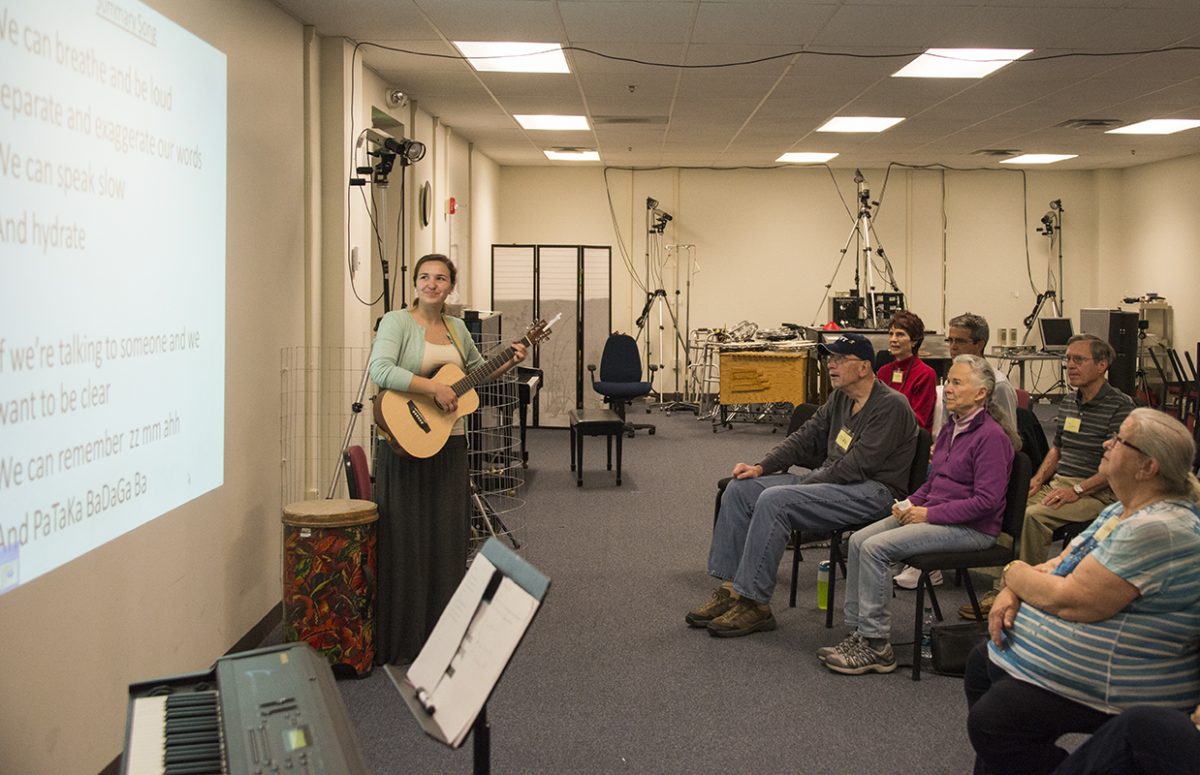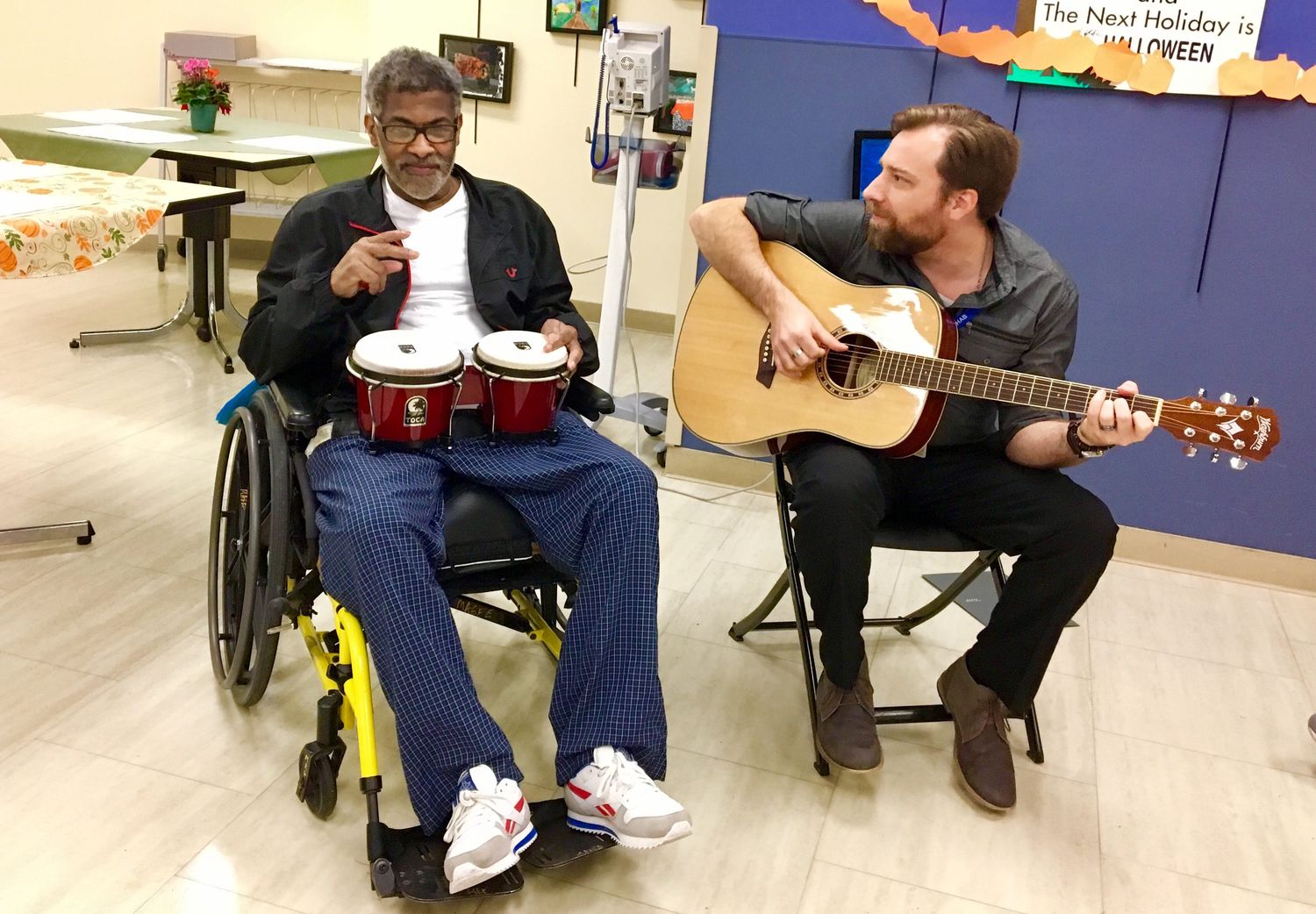Home>Events & Info>Music Therapy>What Is Music Therapy?


Music Therapy
What Is Music Therapy?
Published: February 2, 2024
Discover the healing power of music with music therapy. Explore how music can improve mental, emotional, and physical well-being.
(Many of the links in this article redirect to a specific reviewed product. Your purchase of these products through affiliate links helps to generate commission for AudioLover.com, at no extra cost. Learn more)
Table of Contents
Introduction
Music has always had a profound impact on human emotions, mood, and overall well-being. It has the power to uplift, inspire, and heal. That’s where music therapy comes in. Music therapy is an allied health profession that harnesses the therapeutic and healing properties of music to address a variety of physical, emotional, cognitive, and social needs.
In music therapy, trained professionals use music in a systematic and structured way to achieve specific therapeutic goals. This can involve listening to music, playing musical instruments, singing, composing, improvising, or engaging in other musical activities. The therapeutic relationship between the client and the music therapist is crucial in facilitating communication, self-expression, and personal growth.
Music therapy is not just limited to passive listening or entertainment; it is a clinical and evidence-based practice that has gained recognition in healthcare settings, including hospitals, rehabilitation centers, schools, and mental health facilities. It can be effective for people of all ages, from infants to the elderly, and can be tailored to address a wide range of physical, emotional, and cognitive conditions.
This article aims to delve deeper into the world of music therapy, exploring its definition, history, principles, techniques, and benefits. We will also look at the various applications of music therapy and the training and education required to become a music therapist. Additionally, we will touch upon the ethical considerations and responsibilities involved in the practice of music therapy.
Whether you are a music enthusiast, a healthcare professional, or someone seeking alternative forms of therapy, join us as we embark on a journey through the fascinating field of music therapy, discovering how the power of music can be harnessed for healing and transformation.
Definition of Music Therapy
Music therapy, as defined by the American Music Therapy Association (AMTA), is the clinical and evidence-based use of music interventions to accomplish individualized goals within a therapeutic relationship by a credentialed professional who has completed an approved music therapy program. Music therapy is an established health profession that uses music as a therapeutic tool to address physical, emotional, cognitive, and social needs of individuals of all ages.
Music therapists are skilled in assessing the needs of their clients and designing customized interventions using music to help them achieve specific therapeutic outcomes. These interventions may include singing, playing instruments, listening to music, composing, and improvising. The music therapist uses their knowledge of music and its effects on the brain and body to create a supportive and therapeutic environment.
It is important to note that music therapy is different from music education or entertainment. While music education focuses on teaching musical skills and techniques, and entertainment aims to provide enjoyment and relaxation, music therapy uses music as a clinical tool to address non-musical goals, such as improving communication skills, managing pain, reducing anxiety, enhancing social interaction, and promoting overall emotional well-being.
Music therapy is a holistic approach that recognizes the interconnectedness of the mind, body, and spirit. Through the power of music, it seeks to promote emotional expression, enhance self-awareness, and facilitate positive changes in cognitive and behavioral patterns. Music therapists work collaboratively with clients, using musical experiences to address their unique needs and goals, and to support their overall health and well-being.
Music therapy can be effective for individuals with a range of conditions, including but not limited to neurological disorders, developmental disabilities, mental health conditions, chronic pain, and physical disabilities. It can be used as a standalone therapy or as part of a multidisciplinary approach, complementing other interventions such as speech therapy, occupational therapy, or counseling.
Overall, music therapy offers a creative and non-invasive avenue for individuals to express themselves, process emotions, and work towards personal growth. It harnesses the power of music to provide a therapeutic outlet and support individuals on their journey towards improved physical, emotional, and social well-being.
History of Music Therapy
The use of music for therapeutic purposes dates back thousands of years, with evidence of its healing properties found in ancient civilizations such as the Egyptians, Greeks, and Native Americans. However, the formal discipline of music therapy as we know it today emerged in the 20th century.
During World War I and World War II, musicians volunteered their time to play music for injured soldiers in hospitals. It was observed that live music had a positive impact on the soldiers’ mood, alleviated pain, and facilitated their recovery process. This led to the recognition of music as a valuable therapeutic tool in medical settings.
In the 1940s, the field of music therapy began to gain recognition and professionalization. E. Thayer Gaston, an American physician, was one of the pioneers who advocated for the integration of music into clinical settings. He founded the first academic program in music therapy at the Michigan State University in 1944.
Throughout the 20th century, music therapy continued to develop as a profession, with the establishment of training programs, research initiatives, and professional organizations. In 1950, the National Association for Music Therapy (now known as the American Music Therapy Association) was founded, providing a platform for music therapists to collaborate and advocate for the field.
Music therapy gained recognition as a healthcare profession in the 1990s when the National Institutes of Health (NIH) officially recognized it as a complementary therapy in the United States. This recognition led to increased research funding and further validation of the efficacy of music therapy interventions.
Today, music therapy is practiced in various settings, including hospitals, rehabilitation centers, schools, mental health facilities, and nursing homes. It is used to address a wide range of conditions, including autism spectrum disorder, Alzheimer’s disease, depression, chronic pain, and substance abuse.
The field of music therapy continues to evolve, with ongoing research and advancements in understanding the neurological and psychological mechanisms that underlie its therapeutic effects. Music therapy is increasingly being integrated into interdisciplinary treatment approaches and is recognized as an evidence-based practice.
The rich history of music therapy showcases the enduring power of music as a therapeutic tool. As the field continues to grow and expand, music therapists are at the forefront of promoting the healing and transformative potential of music in improving the quality of life for individuals of all ages and abilities.
Principles of Music Therapy
Music therapy is guided by a set of principles that outline its approach to therapeutic practice. These principles provide a foundation for music therapists to create a safe and effective therapeutic environment. Here are some key principles of music therapy:
- Individualized Approach: Music therapy recognizes that each individual is unique, with their own needs, preferences, and strengths. Music therapists tailor their interventions and techniques to meet the specific goals and requirements of each client. This personalized approach ensures that the therapy resonates with the individual on a deep and meaningful level.
- Therapeutic Relationship: The therapeutic relationship between the music therapist and the client is crucial in music therapy. Building a trusting and supportive bond allows for open communication, empathy, and understanding. The music therapist creates a safe space where the client feels comfortable expressing themselves through music and exploring their emotions.
- Active Engagement: Music therapy encourages active engagement with music. Whether it is playing an instrument, singing, or participating in a group music-making activity, active involvement in the music-making process enhances the therapeutic benefits. Engaging with music stimulates various parts of the brain, promotes self-expression, and fosters a sense of empowerment and personal agency.
- Nonverbal Communication: Music is a universal language that transcends words. In music therapy, nonverbal communication plays a significant role. Music therapists use music as a means of expression, connecting with clients on an emotional level even when verbal communication is challenging. The inherent qualities of rhythm, melody, and harmony can convey emotions, facilitate emotional release, and establish a sense of connection and understanding.
- Creative Expression: Music therapy provides a creative outlet for self-expression. Through musical improvisation, songwriting, and other creative activities, clients are encouraged to explore their inner thoughts and emotions in a non-judgmental and supportive environment. Creative expression in music therapy can promote self-discovery, strengthen self-esteem, and foster personal growth.
- Therapeutic Goals: Music therapy interventions are designed to address specific therapeutic goals. These goals can vary widely depending on the individual’s needs and circumstances. Whether it is improving communication skills, reducing anxiety, managing pain, or enhancing social interaction, music therapists work collaboratively with clients to identify and prioritize therapeutic goals, and then develop strategies to achieve them.
- Evidence-Based Practice: Music therapy is an evidence-based practice, meaning that its interventions and techniques are grounded in scientific research. Music therapists stay up-to-date with the latest research findings and use evidence to inform their practice. By utilizing evidence-based techniques, music therapists ensure that their interventions are effective, safe, and tailored to the unique needs of their clients.
These principles form the foundation of music therapy practice, allowing music therapists to create a therapeutic environment that promotes healing, personal growth, and overall well-being. By honoring these principles, music therapy harnesses the power of music to facilitate positive changes in individuals of all ages and abilities.
Techniques and Approaches in Music Therapy
Music therapy utilizes a variety of techniques and approaches to address the unique needs and goals of each individual. These techniques are tailored to maximize the therapeutic benefits of music. Here are some commonly used techniques and approaches in music therapy:
- Active Music-Making: This approach involves actively engaging in music-making activities, such as playing musical instruments, singing, and moving to music. By participating in the music-making process, individuals can express themselves, release emotions, and actively engage in therapeutic activities.
- Music Listening: Music listening is a passive yet highly effective technique in music therapy. Different types of music, such as calming or uplifting, can be selected to evoke various emotions or create a specific therapeutic atmosphere. Music therapists use carefully selected pieces of music to promote relaxation, reduce anxiety, improve mood, and stimulate cognitive and emotional responses.
- Songwriting: Songwriting offers a creative outlet for individuals to express their feelings, thoughts, and experiences. Music therapists may guide clients in writing their own songs, using lyrics and melodies to tell their stories and explore their emotions. Songwriting can be a powerful tool for self-expression, as well as a means of reflection and personal growth.
- Improvisation: Improvisation allows individuals to spontaneously create music in the moment, without following a pre-determined structure. In a guided improvisation session, music therapists provide a supportive environment for clients to explore their creativity and emotions through spontaneous musical expression. Improvisation can promote self-expression, enhance emotional awareness, and foster communication and connection.
- Rhythm and Percussion: Rhythm-based techniques, such as drumming and percussion, can have a profound impact on physical and emotional well-being. Drumming exercises can synchronize brainwave activity, reduce stress, improve motor coordination, and enhance social interaction. The rhythmic nature of percussion instruments can also promote relaxation and grounding.
- Musical Games and Activities: Music therapists often incorporate musical games and activities to make therapy sessions engaging and enjoyable. These activities can include singing games, interactive movement exercises, group improvisation, and music-based storytelling. Musical games and activities foster social interaction, encourage communication, develop cognitive skills, and provide a sense of fun and playfulness.
- Guided Imagery and Music (GIM): Guided Imagery and Music is a specialized music therapy approach that involves listening to carefully selected music while guided by a trained GIM therapist. The music is chosen to evoke imagery and facilitate exploration of emotions, memories, and personal insights. GIM can be a powerful tool for emotional healing, self-discovery, and personal transformation.
- Group Music Therapy: Group music therapy sessions allow individuals to engage in music therapy within a supportive group setting. Group music therapy can promote social interaction, enhance communication skills, provide a sense of belonging and support, and encourage peer learning and mutual support among participants.
These techniques and approaches in music therapy offer a wide range of options to address the specific needs and goals of each individual. Music therapists utilize their expertise to select and adapt these techniques to create a therapeutic experience that is tailored, meaningful, and effective in promoting physical, emotional, cognitive, and social well-being.
Benefits of Music Therapy
Music therapy offers a plethora of benefits for individuals of all ages and abilities. The therapeutic use of music can have a profound impact on physical, emotional, cognitive, and social well-being. Here are some key benefits of music therapy:
- Emotional Well-being: Music has the power to evoke a wide range of emotions. Music therapy taps into this emotional connection, allowing individuals to express and process their emotions in a safe and supportive environment. Music can help reduce stress, anxiety, and depression, while promoting relaxation, self-awareness, and emotional regulation.
- Pain Management: Music therapy has been shown to be effective in managing pain, both acute and chronic. Listening to music can distract from discomfort and reduce the perception of pain. The rhythmic qualities of music can also help synchronize breathing and heart rate, promoting relaxation and alleviating physical tension.
- Cognitive Enhancement: Engaging in music stimulates various areas of the brain, promoting cognitive functions such as memory, attention, and problem-solving. Music therapy can be particularly beneficial for individuals with cognitive impairments or neurodegenerative conditions, helping to maintain cognitive skills, enhance brain plasticity, and improve overall cognitive functioning.
- Social Skills Development: Music therapy provides a platform for social interaction and connection. Group music therapy sessions, in particular, foster social skills development by promoting communication, active listening, turn-taking, cooperation, and teamwork. Music therapy can help individuals improve their social skills, build relationships, and enhance their sense of belonging.
- Communication and Language Skills: Music has the ability to bypass language barriers and facilitate communication. For individuals with communication disorders or developmental delays, music therapy can provide a non-threatening and enjoyable way to practice and develop communication and language skills. Singing, rhythmic patterns, and musical cues can enhance speech production, articulation, and vocabulary.
- Motor Skills Development: Playing musical instruments and engaging in rhythmic activities can improve motor coordination, fine motor skills, and gross motor skills. Music therapy interventions that involve movement and instrument-playing can be beneficial for individuals with physical disabilities or motor impairments, helping to enhance their motor skills, mobility, and overall physical functioning.
- Self-expression and Creativity: Music therapy encourages individuals to express themselves creatively and authentically. Through music, individuals can freely express their thoughts, emotions, and experiences. The creative aspect of music therapy fosters self-expression, boosts self-esteem, and promotes a sense of empowerment and self-identity.
- Stress Reduction: Music has a calming and soothing effect on the body and mind. Engaging in music therapy can help reduce stress and promote relaxation. The melodic and rhythmic qualities of music have been shown to lower heart rate, decrease blood pressure, and reduce levels of stress hormones. Music therapy provides a therapeutic escape from the demands and pressures of everyday life.
These are just a few of the many benefits that music therapy offers. The power of music to heal, inspire, and transform is undeniable, and music therapy harnesses this power to support individuals in their journey towards improved well-being and quality of life.
Applications of Music Therapy
Music therapy has a wide range of applications and can be beneficial for individuals with various physical, emotional, cognitive, and social needs. Here are some common applications of music therapy:
- Special Education: Music therapy is widely used in special education settings to support individuals with developmental disabilities such as autism spectrum disorder, Down syndrome, and intellectual disabilities. It can help improve communication, social interaction, cognitive skills, and emotional expression.
- Mental Health: Music therapy is effective in addressing mental health conditions such as depression, anxiety, and post-traumatic stress disorder (PTSD). It provides a creative outlet for emotional expression, helps individuals develop healthy coping mechanisms, and promotes relaxation and stress reduction.
- Geriatric Care: Music therapy is valuable in promoting cognitive functioning, memory recall, and emotional well-being in older adults. It can be used in dementia care to evoke memories and improve quality of life. Music therapy can also provide sensory stimulation, reduce agitation, and enhance social engagement among older adults.
- Physical Rehabilitation: In rehabilitation settings, music therapy can aid in the recovery and rehabilitation process. It can help improve motor skills, coordination, and balance, making it beneficial for individuals with stroke, traumatic brain injury, or physical disabilities. Music therapy can also decrease pain perception and increase motivation during physical therapy sessions.
- Speech and Language Development: Music therapy can support speech and language development in individuals with communication disorders or delays. The rhythm and melodic structure of music can enhance speech production, articulation, and vocabulary. It provides a fun and engaging way to practice and develop communication skills.
- Oncology: Music therapy has shown positive effects in supporting individuals undergoing cancer treatments. It can help reduce anxiety, manage pain and side effects of treatment, improve mood, and provide emotional support during the challenging journey of cancer treatment.
- Stress Management: Music therapy is effective in stress management and relaxation. It can be used in various settings such as workplaces, community centers, and wellness programs to reduce stress, enhance coping skills, and promote emotional well-being.
- Pediatric Care: Music therapy is widely used in pediatric healthcare settings to address a variety of needs. It can provide comfort and distraction for children during medical procedures, support emotional expression and pain management, and promote cognitive and social development.
These are just a few examples of the many applications of music therapy. The versatility of music therapy allows it to be tailored to the specific needs and goals of each individual, making it a valuable and effective intervention in various healthcare and educational settings.
Training and Education in Music Therapy
Becoming a music therapist requires a specialized education and training. To practice as a professional music therapist, individuals need to complete specific academic and clinical requirements. Here is an overview of the training and education required in music therapy:
Academic Preparation: Most countries require a bachelor’s degree in music therapy from an accredited university or college. The curriculum typically includes coursework in music theory, music history, psychology, anatomy, and physiology. Students also learn about therapeutic interventions, research methods, and professional ethics specific to music therapy.
Clinical Training: In addition to academic coursework, students must complete a certain number of supervised clinical hours as part of their training. These clinical training experiences provide students with hands-on experience in designing and implementing music therapy interventions under the guidance of experienced music therapists. Clinical placements may be in various settings such as hospitals, rehabilitation centers, schools, or mental health facilities.
Certification: After completing the required academic and clinical requirements, individuals can pursue certification in music therapy. Certification requirements vary by country, but typically involve meeting specific competency standards and passing a certification exam. Certification offers professional recognition and demonstrates a commitment to the highest standards of practice in music therapy.
Continuing Education: Music therapists are expected to engage in ongoing professional development to stay updated with the latest research and practices in the field. Continuing education opportunities, such as workshops, conferences, and additional certification programs, allow music therapists to expand their knowledge and skills and enhance their effectiveness as practitioners.
Professional Organizations: Joining professional organizations, such as the American Music Therapy Association (AMTA) or the World Federation of Music Therapy (WFMT), is highly recommended for music therapists. These organizations provide resources, support, networking opportunities, and advocacy for the field of music therapy. They also offer professional conferences and publications to facilitate knowledge exchange and professional growth.
It is important to note that the specific requirements for training and education in music therapy may vary depending on the country or region. It is advisable to consult with the relevant professional organization or regulatory body in your area to ensure compliance with local regulations and guidelines.
By completing the necessary education and training, music therapists are equipped with the knowledge and skills to provide effective and evidence-based interventions. They are prepared to work with diverse populations and address a wide range of physical, emotional, cognitive, and social needs using the power of music.
Ethical Considerations in Music Therapy
As in any healthcare profession, music therapy is guided by a set of ethical principles that ensure the well-being and rights of the clients. These ethical considerations provide a framework for music therapists to maintain professional standards and integrity. Here are some important ethical considerations in music therapy:
- Confidentiality: Music therapists are bound by strict confidentiality guidelines. They are responsible for safeguarding the privacy and confidentiality of their clients’ personal information and maintaining professional boundaries. Sharing client information without proper consent is prohibited, and therapists must take appropriate measures to ensure privacy and confidentiality.
- Informed Consent: Informed consent is a fundamental ethical principle in music therapy. Music therapists must ensure that clients or their legal guardians fully understand the nature and purpose of the therapy, potential risks and benefits, and their rights to participate or withdraw from the therapy at any time. Informed consent is an ongoing process that requires clear and honest communication between the therapist and the client.
- Cultural Sensitivity: Music therapists must be mindful of cultural diversity and respect the cultural values, beliefs, and traditions of their clients. They should strive to create an inclusive and culturally sensitive therapeutic environment that honors and responds to the unique needs and perspectives of individuals from different cultural backgrounds.
- Professional Boundaries: Maintaining professional boundaries is crucial in music therapy. It is essential for music therapists to establish clear and appropriate boundaries with their clients to protect the therapeutic relationship. They should avoid any form of dual relationships that may compromise objectivity or create conflicts of interest.
- Scope of Practice and Competence: Music therapists should practice within their scope of competence, drawing from their education, training, and experience. It is important for therapists to recognize their limitations and refer clients to appropriate professionals when the client’s needs fall outside their realm of expertise.
- Supervision and Continuing Education: Music therapists have a professional responsibility to engage in ongoing supervision and continuing education. Supervision provides guidance, support, and accountability, while continuing education ensures that therapists stay up-to-date with the latest research, interventions, and ethical guidelines in the field of music therapy.
- Research and Evidence-Based Practice: Ethical music therapy practice involves using evidence-based interventions and staying informed about current research. Music therapists should critically evaluate research findings and apply them to their practice, making informed decisions based on the best available evidence.
- Advocacy and Professional Conduct: Music therapists have a responsibility to advocate for the profession and promote its value in healthcare and education settings. They should adhere to professional standards of conduct, uphold the integrity of the profession, and work collaboratively with other professionals to enhance the well-being of their clients.
These ethical considerations serve as a guide for music therapists to uphold the highest standards of professional practice and ensure the well-being and rights of the clients they serve. By adhering to these ethical principles, music therapists can maintain trust, provide quality care, and make a positive impact on the lives of their clients.
Conclusion
Music therapy is a powerful and transformative allied health profession that utilizes the therapeutic properties of music to address a wide range of physical, emotional, cognitive, and social needs. Through personalized interventions and the therapeutic relationship between the music therapist and client, music therapy promotes healing, self-expression, and personal growth.
From its ancient roots to its formalization in the 20th century, music therapy has gained recognition as an evidence-based practice in various healthcare and educational settings. Whether it is supporting individuals with developmental disabilities, facilitating emotional expression in mental health care, aiding in physical rehabilitation, or promoting social interaction in geriatric care, music therapy offers countless benefits.
The principles of music therapy guide practitioners in creating a safe and effective therapeutic environment. With techniques such as active music-making, music listening, songwriting, and improvisation, music therapists empower individuals to express themselves, manage emotions, and develop essential skills.
Music therapy is not only about creating music; it is about harnessing its power to improve well-being. Whether it is enhancing emotional well-being, managing pain, promoting cognitive functioning, or fostering social interaction, the applications of music therapy are vast and impactful.
Becoming a music therapist requires specialized education, clinical training, and ongoing professional development. Adhering to strict ethical considerations, maintaining confidentiality, and upholding professional standards ensure the highest level of care and respect for clients.
In conclusion, music therapy offers a unique and holistic approach to healing and personal growth. It has the ability to touch hearts, inspire minds, and transform lives. Through the power of music, music therapists provide a therapeutic space where individuals can find comfort, expression, and improved well-being. Music therapy is a powerful profession that continues to evolve, offering hope, healing, and empowerment to individuals of all ages and abilities.











